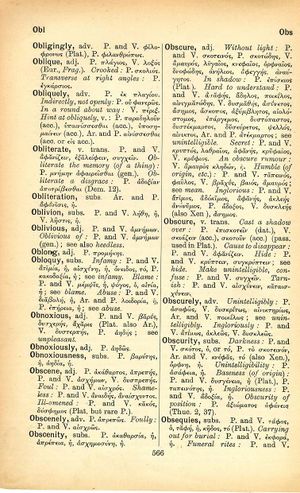obscure: Difference between revisions
Χρηστὸς πονηροῖς οὐ τιτρώσκεται λόγοις → Non vulneratur vir bonus verbo improbo → Ein böses Wort verwundet keinen guten Mann
m (Text replacement - "(|thumb)\n(\|link=)" to "$1$2") |
m (Woodhouse1 replacement) |
||
| Line 1: | Line 1: | ||
{{Woodhouse1 | {{Woodhouse1 | ||
|Text=[[File:woodhouse_566.jpg|thumb|link={{filepath:woodhouse_566.jpg}}]] | |Text=[[File:woodhouse_566.jpg|thumb|link={{filepath:woodhouse_566.jpg}}]] | ||
===adjective=== | |||
[[without light]]: [[prose|P.]] and [[verse|V.]] [[σκοτεινός]], [[prose|P.]] [[σκοτώδης]], [[verse|V.]] [[ἀμαυρός]], [[λυγαῖος]], [[κνεφαῖος]], [[ὀρφναῖος]], [[δναφώδης]], [[ἀνήλιος]], [[ἀφεγγής]], [[ἀναύγητος]]. | |||
[[in shadow]]: [[prose|P.]] [[ἐπίσκιος]] ([[Plato]]). | |||
[[hard to understand]]: [[prose|P.]] and [[verse|V.]] [[ἀσαφής]], [[ἄδηλος]], [[ποικίλος]], [[αἰνιγματώδης]], [[verse|V.]] [[δυσμαθής]], [[ἀσύνετος]], [[ἄσημος]], [[ἄσκοπος]], [[ἀξύμβλητος]], [[αἰολόστομος]], [[ἐπάργεμος]], [[δυστόπαστος]], [[δυστέκμαρτος]], [[δυσεύρετος]], [[ψελλός]], [[αἰνικτός]], [[Aristophanes|Ar.]] and [[prose|P.]] [[ἀτέκμαρτος]]; see [[unintelligible]]. | |||
[[secret]]: [[prose|P.]] and [[verse|V.]] [[κρυπτός]], [[λαθραῖος]], [[ἀφανής]], [[κρυφαῖος]], [[verse|V.]] [[κρύφιος]]. | |||
[[an obscure rumour]]: [[verse|V.]] [[ἀμαυρὸς κληδών]], ἡ. | |||
[[humble]] (of [[origin]], etc.): [[prose|P.]] and [[verse|V.]] [[ταπεινός]], [[φαῦλος]], [[verse|V.]] [[βραχύς]], [[βαιός]], [[ἀμαυρός]]; see [[mean]]. | |||
[[inglorious]]: [[prose|P.]] and [[verse|V.]] [[ἄτιμος]], [[ἀδόκιμος]], [[ἀφανής]], [[ἀκλεής]], [[ἀνώνυμος]], [[prose|P.]] [[ἄδοξος]], [[verse|V.]] [[δυσκλεής]] (also [[Xenophon|Xen.]]), [[ἄσημος]]. | |||
===verb transitive=== | |||
[[cast a shadow over]]: [[prose|P.]] [[ἐπισκοτεῖν]] (dat.), [[verse|V.]] [[σκιάζειν]] (acc.), [[σκοτοῦν]] (acc.) (pass. used in [[Plato]]). | |||
[[cause to disappear]]: [[prose|P.]] and [[verse|V.]] [[ἀφανίζω]], [[ἀφανίζειν]]. | |||
[[hide]]: [[prose|P.]] and [[verse|V.]] [[κρύπτειν]], [[συγκρύπτειν]]; see [[hide]]. | |||
[[make unintelligible]], [[confuse]]: [[prose|P.]] and [[verse|V.]] [[συγχεῖν]]. | |||
[[tarnish]]: [[prose|P.]] and [[verse|V.]] [[αἰσχύνειν]], [[καταισχύνειν]]. | |||
|ἀφανίζειν]]. | |ἀφανίζειν]]. | ||
<b class="b2">Hide</b>: P. and V. κρύπτειν, συγκρύπτειν; see [[hide]]. | <b class="b2">Hide</b>: P. and V. κρύπτειν, συγκρύπτειν; see [[hide]]. | ||
Revision as of 08:49, 20 May 2020
English > Greek (Woodhouse)
adjective
without light: P. and V. σκοτεινός, P. σκοτώδης, V. ἀμαυρός, λυγαῖος, κνεφαῖος, ὀρφναῖος, δναφώδης, ἀνήλιος, ἀφεγγής, ἀναύγητος.
in shadow: P. ἐπίσκιος (Plato).
hard to understand: P. and V. ἀσαφής, ἄδηλος, ποικίλος, αἰνιγματώδης, V. δυσμαθής, ἀσύνετος, ἄσημος, ἄσκοπος, ἀξύμβλητος, αἰολόστομος, ἐπάργεμος, δυστόπαστος, δυστέκμαρτος, δυσεύρετος, ψελλός, αἰνικτός, Ar. and P. ἀτέκμαρτος; see unintelligible.
secret: P. and V. κρυπτός, λαθραῖος, ἀφανής, κρυφαῖος, V. κρύφιος.
an obscure rumour: V. ἀμαυρὸς κληδών, ἡ.
humble (of origin, etc.): P. and V. ταπεινός, φαῦλος, V. βραχύς, βαιός, ἀμαυρός; see mean.
inglorious: P. and V. ἄτιμος, ἀδόκιμος, ἀφανής, ἀκλεής, ἀνώνυμος, P. ἄδοξος, V. δυσκλεής (also Xen.), ἄσημος.
verb transitive
cast a shadow over: P. ἐπισκοτεῖν (dat.), V. σκιάζειν (acc.), σκοτοῦν (acc.) (pass. used in Plato).
cause to disappear: P. and V. ἀφανίζω, ἀφανίζειν.
hide: P. and V. κρύπτειν, συγκρύπτειν; see hide.
make unintelligible, confuse: P. and V. συγχεῖν.
tarnish: P. and V. αἰσχύνειν, καταισχύνειν.
Latin > English (Lewis & Short)
obscūrē: adv., v. obscurus.
Latin > French (Gaffiot 2016)
obscūrē,¹¹
1 sans voir clair, sans distinguer, confusément : Cic. d. Non. 474, 28
2 obscurément, secrètement, en cachette, à la dérobée : Cic. Cat. 4, 6 ; Clu. 54 ; Par. 45 || en termes obscurs, indistinctement : Cic. Inv. 1, 30 ; Ac. 1, 7 ; Att. 2, 19, 5 ; obscurius Cic. de Or. 2, 329 ; Quint. 3, 4, 3 || de naissance obscure : Macr. Sat. 7, 3 ; Amm. 29, 1, 5 || -rissime Cic. Verr. 2, 4, 53 ; Gell. 17, 13, 5.
Latin > German (Georges)
obscūrē, Adv. (obscurus), I) dunkel, cernere, Cic. Acad. II. fr. 10 (aus Non. 474, 28). – II) bildl., dunkel, a) = undeutlich, unvernehmlich, unverständlich (Ggstz. plane), disserere, Cic.: obscurius dicere, Cic. u. Quint. – b) = im dunkeln, unvermerkt, insgeheim (Ggstz. aperte, perspicue), Cic.: alqd non obsc. ferre, Cic., od. gerere, Suet., etw. nicht geheimhalten, sich merken lassen. – c) = unbekannt, unberühmt, regnare obscurius, ziemlich ruhmlos, Eutr. – bes. der Herkunft nach, obsc. natus, von dunkler, niedriger Herkunft, Eutr. u. Macr.: obscurissime natus, Eutr. u. Amm.

